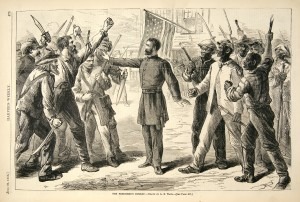Guy Mount in Black Perspectives:
 Slaves freed themselves. With this majestic assertion in 1935, W.E.B. Du Bois all but cemented Black Reconstruction as one of the most influential American history books of the twentieth century. At the time of its publication, it was widely denounced. Writing from the depths of the Great Depression, and amidst a burgeoning black communist internationalism, Black Reconstruction was Du Bois at his finest. By deftly applying classical Marxist analysis to a population so often overlooked by its orthodoxies, Du Bois’s general strike thesis emerged not only as a historical corrective, but as a stark critique of Western philosophy and modern academic inquiry itself. It brought together the study of class with the study of race and foreshadowed what we now call intersectionality. Yet, it also sat on the shelf for decades until, like so many great masterpieces, it was dusted off well after its creator’s death and celebrated only in Du Bois’s absence. As the great American poet/sometimes performance artist Kanye West reminds us: “people never get the flowers when they can still smell them.”
Slaves freed themselves. With this majestic assertion in 1935, W.E.B. Du Bois all but cemented Black Reconstruction as one of the most influential American history books of the twentieth century. At the time of its publication, it was widely denounced. Writing from the depths of the Great Depression, and amidst a burgeoning black communist internationalism, Black Reconstruction was Du Bois at his finest. By deftly applying classical Marxist analysis to a population so often overlooked by its orthodoxies, Du Bois’s general strike thesis emerged not only as a historical corrective, but as a stark critique of Western philosophy and modern academic inquiry itself. It brought together the study of class with the study of race and foreshadowed what we now call intersectionality. Yet, it also sat on the shelf for decades until, like so many great masterpieces, it was dusted off well after its creator’s death and celebrated only in Du Bois’s absence. As the great American poet/sometimes performance artist Kanye West reminds us: “people never get the flowers when they can still smell them.”
More here. (Note: In honor of Black History Month, at least one post will be devoted to its 2025 theme of “African Americans and Labor” throughout the month of February)
Enjoying the content on 3QD? Help keep us going by donating now.
